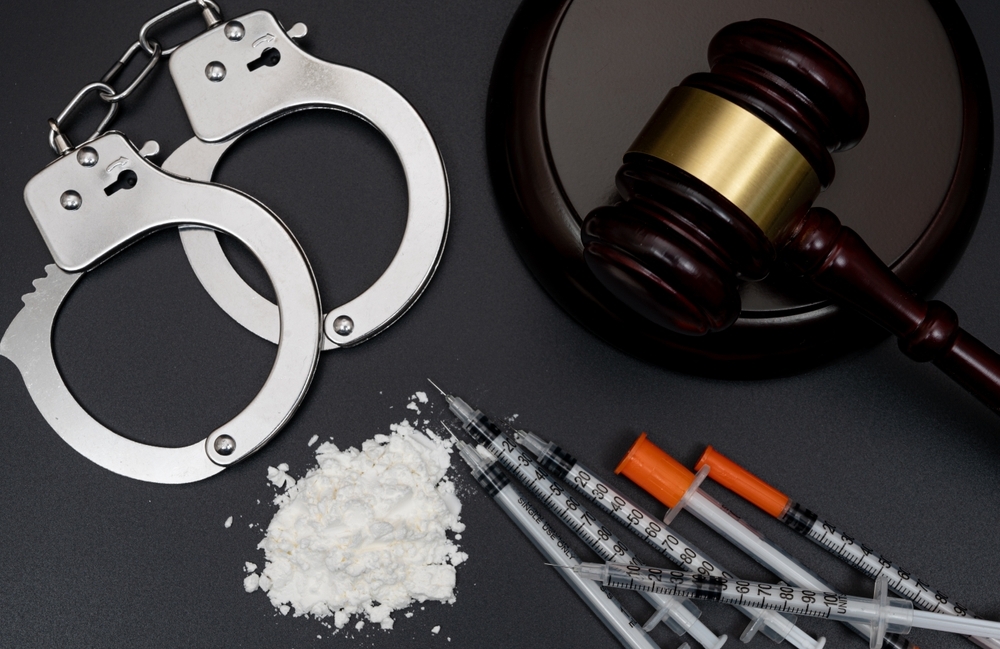
Navigating drug charges in New Jersey can be a complex and overwhelming experience. Understanding the distinctions between possession, distribution, and trafficking is critical, as these charges carry varying degrees of severity and penalties. This guide will provide a detailed breakdown of each type of drug crime charge, their consequences, and common legal defenses, empowering individuals to make informed decisions about their cases.
Understanding Drug Possession in New Jersey
Drug possession refers to having a controlled substance for personal use without a valid prescription. In New Jersey, drug possession charges are governed by the New Jersey Controlled Dangerous Substances Act (N.J.S.A. 2C:35-10).
Types of Possession
- Actual Possession: The drugs are found on your person, such as in your pocket or bag.
- Constructive Possession: You have the ability and intent to control the drugs, even if they are not on your person (e.g., drugs found in your car or home).
Penalties for Possession
The penalties for drug possession depend on the type and quantity of the substance:
- Marijuana (Over 6 ounces): Possession of up to 6 ounces by individuals aged 21 or older is fully legal under New Jersey law. However, possession of more than 6 ounces is a criminal offense, punishable by fines and potential incarceration. Individuals under 21 found in possession of any amount of marijuana may face civil penalties, such as fines or mandatory education programs.
- Schedule I-IV Substances: Penalties for possession of Schedule I-IV substances vary based on the specific drug and quantity involved. For smaller amounts, penalties may include up to 3-5 years in prison and fines reaching $35,000. Possession of larger amounts can escalate to charges of intent to distribute, leading to harsher sentences and higher fines.
New Jersey also has strict liability laws for possession of substances with intent to use, which could include paraphernalia such as syringes or pipes, further emphasizing the need for proper legal guidance.
Drug Distribution in New Jersey
Drug distribution involves the transfer or sale of controlled substances to another person. Unlike possession, distribution charges focus on the intent to distribute, which is often inferred based on the amount of drugs found.
Factors Influencing Distribution Charges
- Quantity: Larger amounts of drugs suggest an intent to distribute.
- Paraphernalia: Items such as scales, baggies, or ledgers can indicate distribution activities.
- Statements: Admissions or witness testimonies linking the accused to distribution.
Penalties for Distribution
Penalties vary widely:
- Small Amounts of Marijuana (1 ounce or less): While possession of up to 6 ounces is legal for personal use, distributing more than 1 ounce without proper authorization is a criminal offense. Penalties may include up to 18 months in prison and fines of up to $25,000, depending on the circumstances and quantity involved. Enhanced penalties may apply if distribution occurs in a drug-free zone or involves minors.
- Heroin or Cocaine: For amounts exceeding 5 ounces, penalties include 10-20 years in prison, with a mandatory minimum sentence of one-third to one-half of the term imposed.
- Synthetic Drugs and Prescription Medications: Penalties depend on the schedule classification and quantity, with distribution of significant amounts leading to sentences comparable to those for cocaine or heroin.
In drug-free zones, such as near schools or public parks, penalties can be significantly enhanced, potentially doubling the prison sentence or fines imposed. This makes legal representation crucial when facing distribution charges.
Drug Trafficking in New Jersey
Drug trafficking is a more severe charge involving the large-scale movement and sale of controlled substances. This charge often overlaps with federal jurisdiction due to its scope.
What Constitutes Trafficking?
- Large Quantities: Possession of substantial amounts of drugs.
- Interstate Activities: Transporting drugs across state lines.
- Organized Networks: Being part of a larger drug distribution ring.
Penalties for Trafficking
Trafficking penalties include:
- Long-Term Incarceration: Sentences can range from 10 years to life imprisonment.
- Asset Forfeiture: Confiscation of property linked to trafficking activities.
- Federal Charges: Additional penalties under federal law may apply, especially for activities involving organized crime or interstate commerce.
Recent updates to New Jersey law clarify that even for state-level trafficking charges, mandatory minimum sentences may apply based on the type and quantity of the substance trafficked. These laws also impose enhanced penalties for individuals caught trafficking within drug-free zones or those employing minors in trafficking activities.
Common Defenses Against Drug Charges
When facing drug charges, a skilled attorney can explore several defenses to protect your rights:
- Illegal Search and Seizure: Evidence obtained without a proper warrant can be challenged under the Fourth Amendment.
- Lack of Possession: Proving the drugs did not belong to you or were not under your control.
- Entrapment: If law enforcement coerced you into committing a crime you otherwise wouldn’t have committed.
- Insufficient Evidence: Highlighting gaps in the prosecution’s case to create reasonable doubt.
The Importance of Hiring an Experienced Attorney
Navigating New Jersey’s drug laws requires in-depth knowledge and strategic planning. An experienced criminal defense attorney can:
- Evaluate the evidence against you.
- Negotiate reduced charges or alternative sentencing.
- Advocate for your rights in court.
Frequently Asked Questions About New Jersey Drug Laws
1. What Is the Difference Between a Disorderly Persons Offense and an Indictable Crime?
Drug possession of small quantities may be a disorderly persons offense, while distribution and trafficking are usually indictable crimes requiring a grand jury indictment.
2. Can First-Time Offenders Avoid Jail Time?
New Jersey’s Pretrial Intervention Program (PTI) offers eligible first-time offenders the opportunity to avoid incarceration by completing rehabilitation and other requirements.
3. What Are Drug-Free Zone Enhancements?
Crimes committed within 1,000 feet of schools or certain public areas may carry enhanced penalties, even for minor offenses.
Contact Attorneys Hartman, Chartered Today for Legal Guidance
Facing drug charges in New Jersey is a daunting experience, but you don’t have to go through it alone. At Attorneys Hartman, Chartered, we provide compassionate, results-driven legal representation to individuals accused of drug-related offenses.
Why Choose Us?
- Decades of experience defending clients in New Jersey.
- Proven success in handling possession, distribution, and trafficking cases.
- Personalized strategies tailored to your unique situation.
Serving Clients Across New Jersey
We proudly serve individuals in Cherry Hill, Camden, Trenton, Atlantic City, Toms River, and surrounding areas. Whether you’re in North Jersey or South Jersey, our team is ready to fight for your rights and freedom.
Take the First Step Towards Justice
If you or a loved one is facing drug charges, time is of the essence. Contact Attorneys Hartman, Chartered today to schedule a confidential consultation. Let us help you protect your future and achieve the best possible outcome for your case.
856-393-6073 or Schedule Your Consultation Online.
Disclaimer: This article is for informational purposes only and does not constitute legal advice. For specific legal guidance tailored to your situation, please contact a qualified criminal defense attorney.
